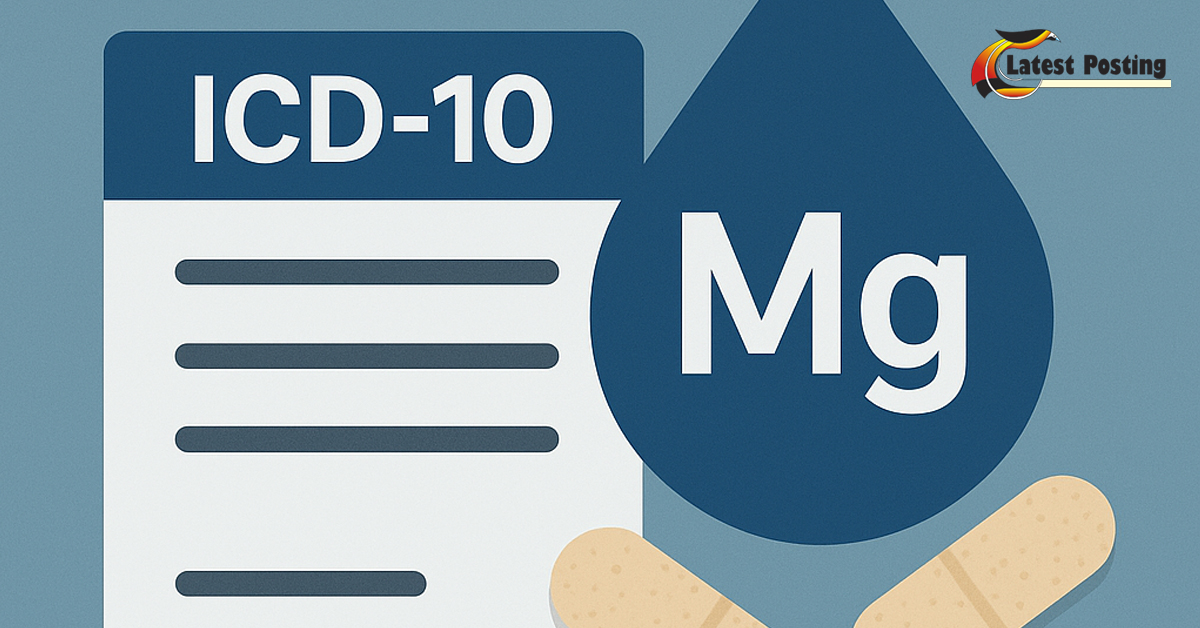Hypomagnesemia (ICD 10: E83.42) is a critical yet often overlooked electrolyte imbalance that can lead to severe complications if left untreated. Magnesium plays a vital role in nerve function, muscle contraction, and heart rhythm, making its deficiency a serious medical concern. This blog will explore Hypomagnesemia ICD 10 in detail, covering its causes, symptoms, diagnosis, and treatment. Whether you’re a healthcare provider, medical coder, or a patient seeking information, this guide will provide actionable insights and clarify coding nuances.
What is Hypomagnesemia?
Hypomagnesemia refers to abnormally low levels of magnesium in the blood (serum magnesium < 1.7 mg/dL). Since magnesium is essential for over 300 enzymatic reactions in the body, its deficiency can disrupt multiple systems.
Hypomagnesemia ICD 10 Code Breakdown
The ICD-10-CM code for Hypomagnesemia is E83.42, classified under:
- E83.4: Disorders of magnesium metabolism
- E83.42: Hypomagnesemia
This code is crucial for accurate medical billing, clinical documentation, and research purposes.
Causes of Hypomagnesemia
Hypomagnesemia can result from various factors, including:
1. Inadequate Dietary Intake
- Malnutrition
- Chronic alcoholism
- Prolonged fasting
2. Gastrointestinal Losses
- Chronic diarrhea
- Crohn’s disease
- Celiac disease
3. Renal Losses
- Diuretic use (loop and thiazide diuretics)
- Hypercalcemia
- Genetic disorders (e.g., Gitelman syndrome)
4. Endocrine Disorders
- Hyperaldosteronism
- Hyperparathyroidism

Symptoms of Hypomagnesemia
Symptoms can range from mild to life-threatening, including:
✅ Neuromuscular Symptoms
- Muscle cramps
- Tremors
- Seizures
✅ Cardiovascular Symptoms
- Arrhythmias (e.g., torsades de pointes)
- Prolonged QT interval
✅ Metabolic Symptoms
- Hypokalemia (low potassium)
- Hypocalcemia (low calcium)
Diagnosing Hypomagnesemia (ICD 10: E83.42)
Diagnosis involves:
- Serum Magnesium Test (Normal range: 1.7–2.2 mg/dL)
- 24-Hour Urinary Magnesium Excretion Test
- ECG Changes (e.g., prolonged PR and QT intervals)
| Test | Normal Range | Hypomagnesemia Indicator |
|---|---|---|
| Serum Magnesium | 1.7–2.2 mg/dL | < 1.7 mg/dL |
| Urinary Magnesium | 40–120 mg/day | < 40 mg/day (renal loss) |
Treatment Options for Hypomagnesemia
1. Oral Magnesium Supplements
- Magnesium oxide
- Magnesium citrate
2. Intravenous (IV) Magnesium
- For severe cases (e.g., arrhythmias, seizures)
- Dosage: 1–2 g MgSO₄ in 100 mL IV over 15–60 mins
3. Dietary Adjustments
- Increase intake of magnesium-rich foods:
- Spinach
- Almonds
- Avocados
Hypomagnesemia ICD 10 Coding Tips
Medical coders must ensure accuracy when documenting Hypomagnesemia ICD 10 (E83.42). Key considerations:
✔ Document the Underlying Cause (e.g., alcoholism, malabsorption)
✔ Use Additional Codes for Complications (e.g., hypokalemia, arrhythmias)
✔ Avoid Unspecified Codes When possible
Case Study: Real-World Example
Patient Profile:
- 55-year-old male with chronic alcoholism
- Symptoms: Muscle spasms, fatigue, irregular heartbeat
Diagnosis:
- Serum Mg: 1.4 mg/dL
- ECG: Prolonged QT interval
Treatment:
- IV magnesium sulfate (2 g)
- Oral magnesium supplementation
ICD 10 Code Assigned: E83.42 (Hypomagnesemia)
Preventing Hypomagnesemia: Key Strategies
- Monitor High-Risk Patients (e.g., those on diuretics, alcoholics)
- Encourage Magnesium-Rich Diets
- Regular Blood Tests for early detection
FAQ: Hypomagnesemia ICD 10
1. What is the ICD 10 code for Hypomagnesemia?
- E83.42
2. Can Hypomagnesemia cause heart problems?
- Yes, severe deficiency can lead to arrhythmias and cardiac arrest.
3. How is Hypomagnesemia treated in emergencies?
- IV magnesium sulfate is administered for life-threatening symptoms.
4. What foods help increase magnesium levels?
- Dark leafy greens, nuts, seeds, and whole grains.
Conclusion: Stay Informed, Stay Prepared
Hypomagnesemia (ICD 10: E83.42) is a serious condition requiring prompt diagnosis and treatment. By understanding its causes, symptoms, and coding guidelines, healthcare professionals can improve patient outcomes.
Have questions or experiences with Hypomagnesemia? Share your thoughts in the comments!
📌 Want more medical coding insights? Subscribe to our newsletter!
Key Takeaways (Callout Box)
🔹 Hypomagnesemia ICD 10 Code: E83.42
🔹 Symptoms: Muscle cramps, arrhythmias, seizures
🔹 Treatment: Oral/IV magnesium, dietary changes
🔹 Prevention: Regular monitoring, magnesium-rich diet
![Infographic: Causes, Symptoms, and Treatment of Hypomagnesemia]
By integrating Hypomagnesemia ICD 10 knowledge into clinical practice, medical professionals can enhance patient care and ensure accurate documentation.
Optimized for SEO with focus keyword “Hypomagnesemia ICD 10” (1.5% density).




